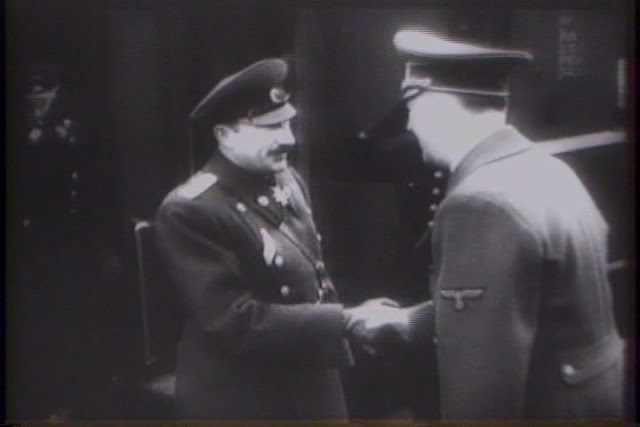 |
| Tsar Boris III of Bulgaria meeting Adolf Hitler in 1943, shortly before his death. Image: Wikimedia Commons |
Many Bulgarians never doubted this claim, because it would
placed their dead tsar at a better light and strengthen Bulgaria 's image as a
victim of the Nazi's cruelty.
But the Nazis were not the only suspects. A year before, Bulgarian Communist leaders, Generals Loukov, Pantev, and Yanev, were assassinated and it was only natural attribute the king's death to the Communists.
Writing on his diary, Colonel von Schoenebeck, a German attaché in Sofia, claimed that two German doctors who attended the King – Sajitz and Hans Eppinger – both believed that he had died from the same poison that Dr. Eppinger had allegedly found two years prior following the postmortem of Greek Prime Minister, Ioannis Metaxas. The poison claimed the prime minister’s life slowly, causing the appearance of blotches on the skin of its victim before death.[12] “The suspicion increased with the appearance of odd signs of disintegration of inner organs,” Schoenebeck wrote. In the morning of August 28, things turned from bad to worse for King Boris. His brain was already affected and he died “in horrendous pain.”
The Bulgarian Cabinet declared 40 days of mourning for King Boris. Theatres and cinemas closed down and no wedding was held in Sofia for one week. An outpour of weeping crowds lined the streets of the capital and impressive state funeral at the Alexander Nevsky Cathedral. His coffin was taken by train to the mountains and buried in Bulgaria's largest and most important monastery, the Rila Monastery.
His six-year-old son ascended the throne as Simeon II, under a Regency Council headed by Boris's brother Prince Kiril of Bulgaria. In 1946, a Soviet-backed referendum abolished the monarchy and Simeon was forced out of the country.

.png)





0 Comments